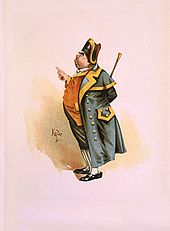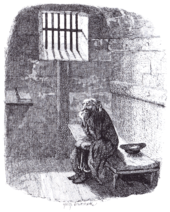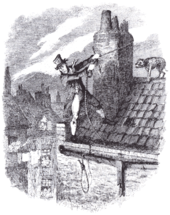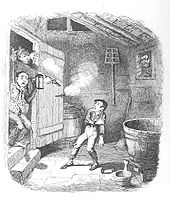Oliver Twist
Oliver Twist is a social novel by Charles Dickens , who, under the full title Oliver Twist; or, The Parish Boy's Progress ("Oliver Twist or the Way of the Welfare Child") appeared in sequels in Bentley's Miscellany from February 1837 to April 1839 . Oliver Twist is Dickens' second novel. It has been adapted several times for theater, cinema, television and comics.
action


The novel tells the story of the foundling and orphan boy Oliver Twist, who grows up in the poor house of a small English town without knowing anything about his origins. Forced by the catastrophic conditions in the poor house, he asks for more food, whereupon he is locked in the coal cellar for a week. It is also written out that the congregation will reward those who would take care of them. This leads him to the resident coffin carpenter named Mr. Sowerberry, who does an honest job and gradually comes to love the boy in his own way. The secondary apprentice Noah Claypole insults Oliver's dead mother, which is why Oliver fights him and he is punished with beatings for it. He then flees to London on foot. It takes Oliver seven days to get there exhausted.
In London, he falls into the clutches of the Jewish fender Fagin (boss of thieves), who saves him from certain death in the street by feeding him. His protégés form a gang of thieves, which mainly consists of street boys. Fagin also introduces Oliver to the thief trade.

The extremely brutal loner Bill Sikes and his loved one, Nancy, who is connected to Sikes in a peculiar way, also enter Oliver's life at this time. Living and learning in such a company, one day Oliver is taken on a thief tour, which has fatal consequences for him. After the victim, Mr. Brownlow, realizes that he has been stolen, Oliver is mistaken for the thief. During the interrogation at the police station, Oliver passed out in a feverish fit and was finally exonerated by a witness, much to the pleasure of the compassionate Mr. Brownlow, who took the boy under his wing and had him nursed back to health.
For the first time in his life, Oliver gratefully experiences the kindness and love of a maternal care from Mr. Brownlow's housekeeper Mrs. Bedwin, who cares for him self-sacrificingly. The good time is short-lived, however, and ends when Mr. Brownlow sends Oliver off on an errand, which he has to do as quickly as possible. Nancy and Sikes intercept the boy and force him to return to Fagin and his gang of thieves. Mr. Brownlow remains offended in the belief that Oliver ran away with the money he gave to run the errands.
Fagin then tries to train Oliver to be a thief. For a very long time Oliver ekes out his existence in the thief's hut without ever having an opportunity to escape. After all, he is scheduled to break into the Maylies' house. For this purpose, Fagin hands Oliver over to Sikes, who is supposed to use him for the break-in. However, the break-in fails. When trying to break into the house through a small window, Oliver is shot. Sikes and his assistant drag the unconscious boy with them on their escape, but they can soon no longer carry him and leave him in a ditch.
Oliver can drag himself to the door of the property the next morning, where he collapses and is nursed back to health by the residents of the house. Here he gets to know the Maylies, who accept him just as kindly and sacrificially as Mr. Brownlow previously. Oliver spends the best time of his life in the house and is always attentive to its residents. When he drives to Mr. Brownlow's house with the family doctor to prove his experienced history and to finally get rid of the bad reputation he has with Mr. Brownlow, he finds the house empty and for sale.
The love he experiences in the Maylie household, however, continues. Meanwhile, Fagin and Monks - at this point a dark, opaque figure - are feverishly trying to find out where Oliver is. When they succeed after a while, they forge a plan how they can get Oliver out of the way without coming into contact with it themselves. However, Nancy learns of this sinister plan and puts her life in danger when she seeks out Rose Maylie and tries to warn of what is about to happen to Oliver. However, Nancy is only willing to reveal the bare essentials about Sikes, Fagin and Monks, namely only the place where the latter can be found and what it looks like. She does not want the three of them to be prosecuted by the police because she feels hopelessly and existentially connected to the criminal milieu, which she has hated by now. She doesn't want to betray those who trusted her and whom she could trust.
Oliver happens to see Mr. Brownlow again when he moves in near the Maylies. The Maylies then forge a plan with Mr. Brownlow to protect Oliver. They get hold of Monks, who - which Oliver does not know at the time - is his half-brother and has set himself the goal in life of making his life hell out of hatred and continuing to withhold his father's inheritance from him.

When Fagin learns that Nancy has betrayed the gang, he cleverly lets Sikes know about this, knowing that he will kill Nancy, advising that one be careful. In a bloody frenzy, Sikes slays his companion Nancy, but a short time later suffers a mental shock. Although he can still escape at first, he is arrested in London afterwards and accidentally strangles himself on the run. Fagin finally expects the same fate on the gallows through the skillful uncovering of all the circumstances and thefts by Mr. Brownlow.
As the story progresses, he understands that coincidence has driven none other than the unknown son of his friend Edwin Leeford into his arms, who was believed lost. He recognizes this solely on the basis of Oliver's similarity to the portrait of his mother Agnes Fleming, which Edwin Leeford Brownlow had presented and which now hangs in his house.
The reader later learns that Edwin Leeford, Oliver and Monks 'father, was unhappily married to Monks' mother. When one of his richest relatives died and left him a lot of money, Edwin Leeford immediately set off to travel to Rome, where this relative lived for health reasons. Once there, Edwin Leeford fell ill with a fatal disease. Before leaving, however, Edwin Leeford visited his old childhood friend again, on the occasion of which he left the picture of Agnes Fleming, Oliver's mother, whom he was reluctant to leave behind but could not take with him because of the hurry his journey required. He wanted to settle his wife and Monks with part of the inherited money and then leave England with Agnes Fleming. After Mr. Brownlow began to believe that Edwin Leeford had died, he tried to track down Agnes Fleming as he wanted to take care of the illegitimate child in the event of Edwin Leeford's death.
In addition, at the end it turns out that Oliver's maternal grandfather, Mr. Fleming, had two daughters: Agnes and Rose. Rose is none other than the lovely young woman who was raised by Mrs. Maylie.
Monks is released on condition that he certifies Oliver's parentage and never harasses him again. Far from England, Monks finally dies because he rejoins a gang of thieves and is captured. Eventually Oliver is adopted by Mr. Brownlow and his housekeeper Mrs. Bedwin and lives there.
Literary criticism
The novel was a great success. Above all through his sometimes drastic portrayal of child labor , crime and pauperism at the time of early industrialization - which stood in sharp contrast to the cozy, cheerful mood of Dickens' first novel The Pickwickier - he attracted considerable attention. In contrast to this great social realism of the book stands the unbelievable character drawing noted by the criticism, namely the main character. Kindler's literary dictionary complains about:
"The young hero looks unbearably noble and, although there is no prerequisite for it, well-educated and middle-class : a hero according to the common clichés ."
Criticism of anti-Semitic stereotypes
The anti-Semitic stereotypes with which Dickens draws the figure of Fagin are still the subject of discussion today. The fictional character Fagin not only serves pretty much all common anti-Semitic prejudices, the criminal Fagin is not named in more than 250 passages in the text, but only referred to as the Jew. All other Jews who appear in the novel Oliver Twist are also described as extremely vicious and ugly. In later editions of the book, they were toned down by Dickens himself, but in the numerous adaptations that the material has undergone (had), they are often completely eliminated.
Dickens himself spoke out several times in later years on the charge of anti-Semitism. He himself had an extensive knowledge of London street life and child exploitation, and in a letter to a Jewish woman who had protested the stereotypical treatment of Fagin, he tried to reduce the problem to a problem of historical truthfulness. He wrote: "Unfortunately, at the time the story relates, it was true that this class of criminals was almost always a Jew."
expenditure
- Oliver Twist; or, The Parish Boy's Progress. By "Boz." Plates designed and etched by George Cruikshank. In: Three Volumes. London: Richard Bentley, New Burlington Street. 1838. - the first edition
- Oliver Twist, The Parish Boy's Progress. By Boz. Paris, A. and W. Galignani and C. 1839 - early English edition in Paris
- Oliver Twist; or, The Parish Boy's Progress. Paris, European Library 1839 (Collection of Ancient and Modern British Authors CCXXIC) - early English edition in Paris
- Oliver Twist; or, The Parish Boy's Progress. Leipzig, Frederick Fleischer 1839 (The complete works of Charles Dickens 3) - early English edition in Germany
- German translations
- Oliver Twist. From Boz (Dickens). Translated from the English by H. Roberts. With pen drawings after Cruikshank. 3 parts . Leipzig, JJ Weber. 1838/39 - the first German edition, unless the edition listed below appeared in parallel
- Boz: Oliver Twist or the career of an orphan boy. Translated from the English by Dr. A. Diezmann. In three parts. With a pen drawing after Phiz . Braunschweig, Westermann 1838/1839.
- Oliver Twist. From Boz (Dickens). Translated from the English by H. Roberts. With pen drawings after Cruikshank. 3 parts . Leipzig, JJ Weber. 1839 (Boz: all works seventh, eighth and ninth part) - this is probably the third German edition
- Oliver Twist . Novel. Translated by Gustav Meyrink . [1914]. Berlin 2011. Insel Taschenbuch 4077, ISBN 978-3-458-35777-3 .
- Oliver Twist, or: The Career of a Boy from the Poor House . Afterword and translation by Axel Monte. Stuttgart: Reclam, ISBN 978-3-15-010713-3 .
- Oliver Twist . Translated by C. Kolb and A. Ritthaler. With 24 illustrations by G. Cruikshank. With afterword u. Timeline by Uwe Böker . 11th edition. 2006. Artemis, Winkler, ISBN 978-3-538-05357-1 .
- Oliver Twist . 2012, Anaconda Verlag, Cologne, ISBN 978-3-86647-773-5 , translation by Gustav Meyrink
- Oliver Twist - Illustrated Edition . With 24 original drawings by George Cruikshank , 2013/2014, Null Papier Verlag , Düsseldorf / Neuss, ISBN 978-3-943466-28-7 (Kindle), ISBN 978-3-943466-70-6 (Epub), ISBN 978 -3-943466-77-5 (PDF)
Edits
Movie
The work was first filmed in 1909 by James Stuart Blackton . In 1922 there was a version with Lon Chaney and Jackie Coogan in the title role. The 1948 film with Alec Guinness in the role of Fagin is considered excellent. The musical adaptation "Oliver!" Won an Oscar for best film in 1968 . Disney in 1988 the work of an animated film titled Oliver & Co. released. The main roles of animals are shown here. In 1991, another cartoon version was created in England. There is also an animated series that was made in the 1990s. A current film adaptation from 2005 comes from director Roman Polański . For the English-French-Czech-Italian production, the London of the 19th century was recreated near Prague .
All films in chronological order:
Radio plays
The novel was also edited several times as a radio play:
| Title (year) | composer | production | Actor (selection) |
|---|---|---|---|
| Oliver Twist (1957) | Hans Vogt | SDR | Wolf Osenbrück (Oliver), Joseph Offenbach (Fagin) |
| Oliver Twist (1962) | Dora König (director) | Broadcasting of the GDR | Uwe Petersen , Robert Johannsen |
| Oliver Twist (1988) | NDR | Hans Paetsch | |
| Oliver Twist (English) (1995) | BBC | ||
| Oliver Twist (2005) | Jan-Peter Pflug | HörVerlag | Anton Sprick (Oliver), Jörg Pleva (Fagin) |
| Oliver Twist (2006) | John von Düffel | NDR | Thorsten Hierse , Leon Burmeister |
theatre
British composer Lionel Bart set Dickens' novel in his musical Oliver! um, which premiered on June 30, 1960 in London .
The actor and director Sebastian Brummer wrote an adaptation of the material for the Sellawie Theater in Enns , Austria , where the premiere took place on October 20, 2016.
comics
- Will Eisner : Fagin the Jew . Doubleday, New York 2003, ISBN 0-385-51009-8 .
- Loïc Dauvillier, Olivier Deloye: Oliver Twist de Charles Dickens . Delcourt (Collection Ex-Libris), Paris 2007, ISBN 978-2-7560-0671-0 .
- Brockhaus literary comics: Charles Dickens, Oliver Twist / Text: Philippe Chanoinat. Ill .: David Cerqueira. [Translator: Uli Pröfrock], Gütersloh; Munich: Brockhaus, Wissenmedia in der InmediaONE GmbH, 2012, ISBN 978-3-577-07448-3 .
Web links
Texts
- Charles Dickens : Oliver Twist in the Gutenberg-DE project Translation by Julius Seybt
- http://www.online-literature.com/dickens/olivertwist/
- Charles Dickens : Oliver Twist at Zeno.org . (German translation by Gustav Meyrink , 1914).
Movies
- Oliver Twist (1909) in the Internet Movie Database (English)
- Oliver Twist (1912) (USA) in the Internet Movie Database (English)
- Oliver Twist (1912) (UK) in the Internet Movie Database (English)
- Oliver Twist (1916) in the Internet Movie Database (English)
- Oliver Twist (1922) in the Internet Movie Database (English)
- Oliver Twist (1933) in the Internet Movie Database (English)
- Oliver Twist (1948) in the Internet Movie Database (English)
- Oliver Twist (1962) (TV) in the Internet Movie Database (English)
- Oliver Twist (1968) in the Internet Movie Database (English)
- Oliver Twist (1974) in the Internet Movie Database (English)
- Oliver Twist (1982) (TV) in the Internet Movie Database (English)
- Oliver Twist (1982) (TV animation) in the Internet Movie Database (English)
- Oliver Twist (1985) (TV) in the Internet Movie Database (English)
- Oliver & Co. in the Internet Movie Database (English)
- Oliver Twist (1997) (TV) in the Internet Movie Database (English)
- Oliver Twist (1999) (TV) in the Internet Movie Database (English)
- Boy Called Twist in the Internet Movie Database (English)
- Oliver Twist (2005) in the Internet Movie Database (English)
- Oliver Twist (2007) (TV) in the Internet Movie Database (English)
Individual evidence
- ↑ Kindler's literary dictionary . Kindler Verlag, Zurich 1965, Volume 9, p. 6959.
- ^ Geoffrey Nunberg: The Way We Talk Now . Houghton Mifflin Company, Boston / New York 2001, p. 126.
- ^ Charles Dickens: Oliver Twist . Foreword by Irving Howe. Bantam Dell, New York 2005, ISBN 0-553-21102-1 , pp. XIX (English, google.com ): “Dickens himself, in a letter to a Jewish woman who had protested the stereotypical treatment of Fagin, sought to reduce the problem to one of historical verisimilitude. 'Fagin,' he wrote, 'is a Jew because it unfortunately was true, of the time to which the story refers, that class of criminal almost invariably was a Jew.' ”
- ↑ Oliver Twist . Sellawie Theater , accessed November 1, 2016.

